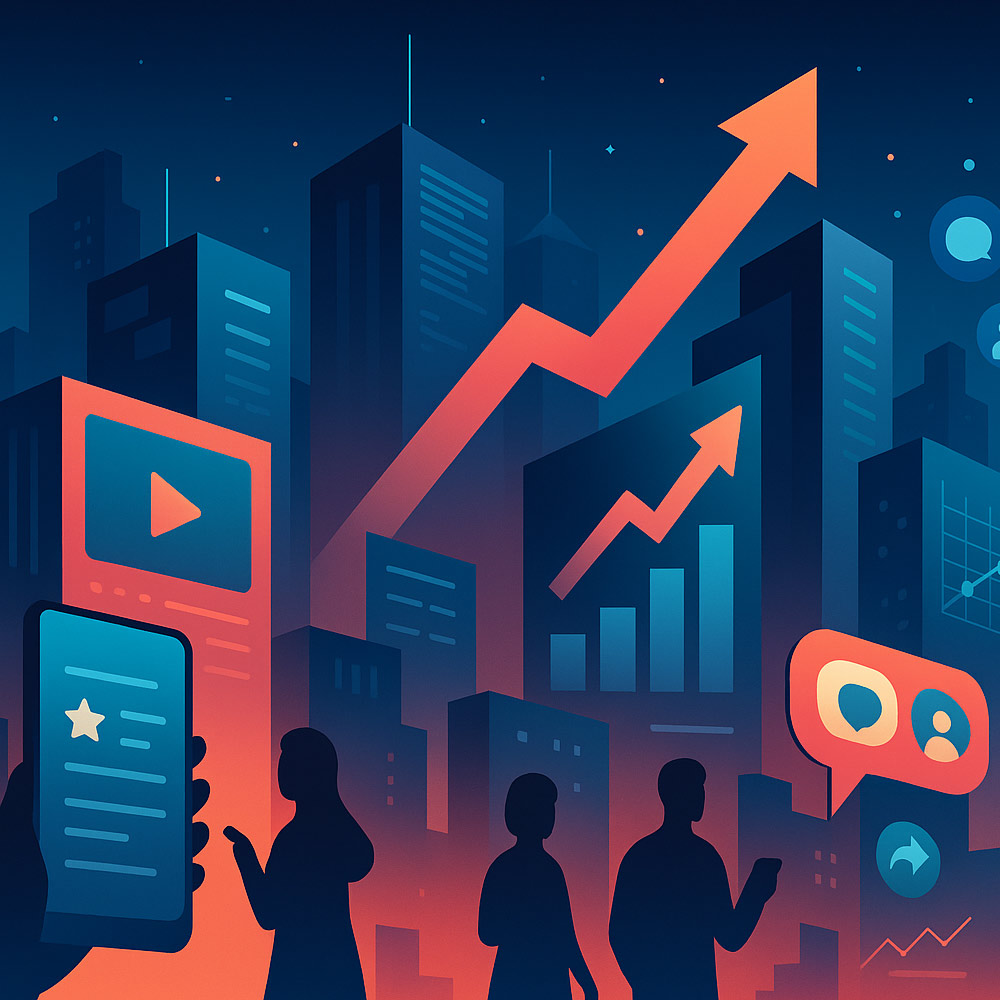
Clinging to a brick-and-mortar business model is a one-way ticket to financial failure in 2024.
Statistics show that 71% of small businesses already have websites. Without an online presence, you risk missing out on valuable business to competitors who have embraced the online playing field.
But online presence alone is not enough.
Optimizing your website is equally crucial to maximize online visibility. That’s where SEO comes in.
Why is SEO Important for A Website?
Since Google’s establishment in 1997, content has been an essential facet of online businesses.
Imagine visiting a bare website. If nothing is interesting there to consume, you’ll likely bounce off the page and head elsewhere. Content is the backbone of any website that aims to inform, engage, and persuade visitors. However, with 2 billion blog posts competing for online attention every year, how do you stand out?
The mechanism responsible for ensuring the effectiveness of your content marketing efforts is search engine optimization.
SEO is the long-term and continuous practice of improving a website’s visibility on search engine results pages to attract more web traffic. Without SEO implementation, websites succumb to online obscurity. Meanwhile, optimized websites reap the lucrative benefits of dominating the organic search real estate. To help you write SEO-optimized content, you can use an AI SEO writing tool.
So, is SEO still relevant in 2025 and beyond? The quick answer is a resounding YES.
Below, we’ll explore the six reasons you should start doing SEO if you haven’t already or double down on your SEO efforts if you already are.
SEO Remains Indefinitely Relevant for 7 Reasons
Saying that SEO helps boost online visibility or drive qualified traffic is a good enough reason. However, countless blogs have mentioned these benefits a million times, and frankly, it already sounds like a broken record.
Below, we’ll examine some numbers and statistics to explain why SEO in 2024 and beyond will remain relevant.
1. Search engines are the best ways to find a business
Google search remains the undisputed go-to for people seeking information. Google holds a dominant market share versus other search engines, at 95.32% on mobile and 81.32% on desktop. In other words, if your website is not ranking on Google, you’re invisible to 9 out of 10 of your potential customers.
Despite the rise of other online channels like social media, SEO is still more effective as a traffic source. Brightedge research says 68% of people start their online activities using search engines, and implementing SEO effectively can drive 1,000%+ more organic traffic than social media.
Having other online marketing channels is advisable. However, optimizing your website for search engines is the biggest driver of organic traffic to your business, which may potentially convert into leads and sales.
According to Google, 4 in 5 searches have local intent, and 76% of consumers searching with “near me” keywords visit a business that same day.
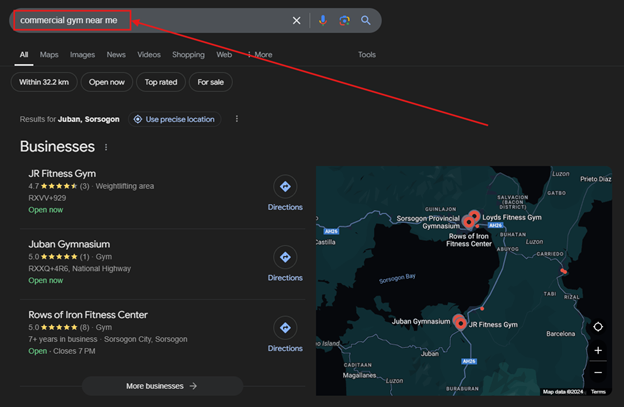
2. Search results are rapidly evolving
Let’s take a trip down memory lane.
The advent of artificial intelligence in 2024, courtesy of OpenAI, marked a significant paradigm shift in humanity’s progress. The company’s generative AI brainchild, ChatGPT, has become a massive hit. With only a few prompts, people can get comprehensive AI-generated content to their questions.
There’s just one problem: generative AI’s answers heavily depend on its training data. According to Sam Altman, ChatGPT is trained until April 2023.
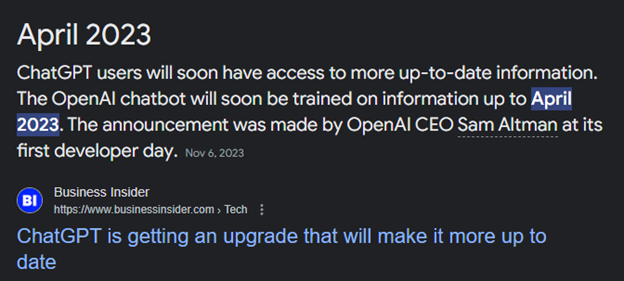
If you ask ChatGPT for information beyond the limits of its training data, it will not generate accurate results, which poses a significant limitation.
Behind the scenes, Google has also been developing its generative AI tool, Gemini (formerly called “Bard”), released in March 2023. Two months later, they introduced the AI Overviews (formerly called “Search Generative Experience”), which directly integrates generative AI content into Google search. Unlike other LLMs, AI Overviews has direct access to the wealth of information on Google’s index.
This brings us to the present day. Google rolled out AI Overviews in the US in May and to over 100 selected countries last October.
Here’s what it looks like:
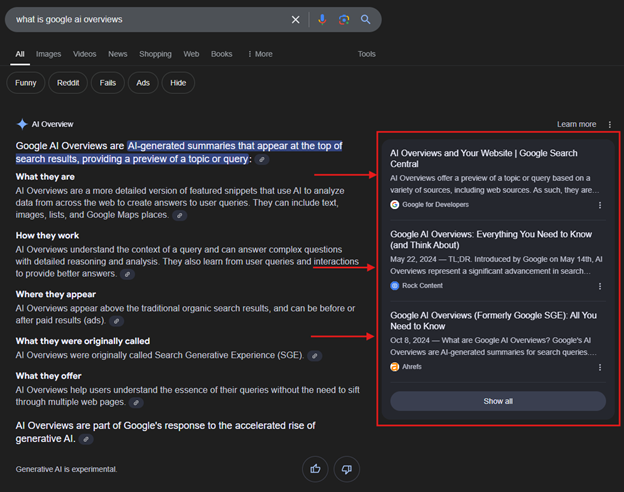
Depending on user search queries, relevant content may appear as sources on the AI snapshot even if these pages don’t rank high on SERPs for their target keywords.
The AI Overviews section radically changes the original layout of Google’s search results page. This created a new battleground for search visibility, especially for smaller websites vying for online attention.
Today, an SEO consultant can actively reverse-engineer AI Overviews to develop new SEO tactics to help business owners land on the AI snapshot.
3. High-quality content is your passive sales personnel
It’s no secret that customers are getting smarter about buying products and trusting businesses. Even in 2019, 81% of customers conducted product research before purchasing. People are naturally more inclined to buy a product or trust a business if it has a reputable online presence.
Content is the best way to demonstrate expertise and build authority.
According to Semrush, 9 of 10 businesses prefer blog posts as the ideal formal content to reach their audiences and achieve business goals. High-quality SEO content acts as your ever-present and tireless sales team. No matter when visitors land on your site, your content is there, working around the clock to provide valuable and engaging information.
DemandMetric reports that companies with blogs get 67% more monthly leads than companies without active blogs. Moreover, Marketing Insider Group adds that personalized content creates a 20% increase in sales opportunities.
Think of your content as a virtual salesperson who can answer questions, address concerns, and ultimately persuade visitors to take action, such as making a purchase or signing up for your newsletter.
Of course, high-quality content can only go so far. Optimizing it for SERPs amplifies its visibility, helping you reach target audiences.
4. SEO practices are ever-changing
SEO is a dynamic digital marketing approach. Google regularly updates its algorithm to improve search results and user experience.
In fact, according to Search Engine Land, Google implemented 4,725 algorithm updates in 2022 alone. Many of these changes are minor and unnoticed, while others are significant and shift the entire search engine landscape. These changes in the Google algorithm breed new SEO practices, which, if not implemented, can pull your search engine positioning.
For example, in the past, Google relied on keywords or key phrases within a content body to rank results. Sneaky SEO practitioners resorted to keyword stuffing to increase their pages’ ranks. This was when Google released the Panda update, which penalized websites with low-quality content and heavily relied on unscrupulous SEO practices.
Other SEO tactics, such as building backlinks and keyword research, have remained the same. Some SEOs also try novel strategies, like creating topic clusters. Which approach works depends on many factors, and working with professionals can help improve your SEO performance.
5. More online businesses are emerging
The rapid growth of e-commerce sites is another reason to invest in SEO. For context, the U.S. only had 3.6 million e-commerce websites in 2019. Fast-forward to 2023, and the number of online websites has ballooned to a staggering 13.98 million. That’s equivalent to a massive 288.33% increase.
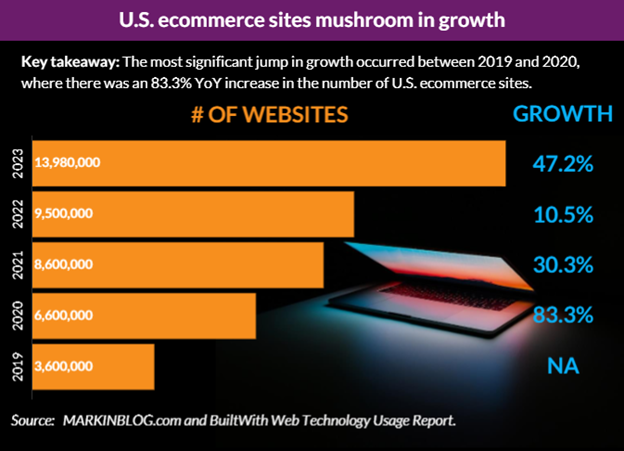
Source: Digital Commerce 360
In 2023, Semrush discovered that 46% of businesses agree that SEO leads to success in content marketing. Multiply that percentage by the number of existing ecommerce sites, and you will get 6.43 million competitors vying for online visibility.
Without SEO, how will you compete with them?
6. Google penalizes websites that violate their algorithm
Google is very particular about rules. Dipping your toes on black-hat (or even gray-hat) SEO tactics can get you in trouble if Google catches on.
Moreover, Google doesn’t discriminate against some users. Last March 2024, even Google executive John Mueller and seasoned SEO expert Julian Goldie were removed from Google’s index.
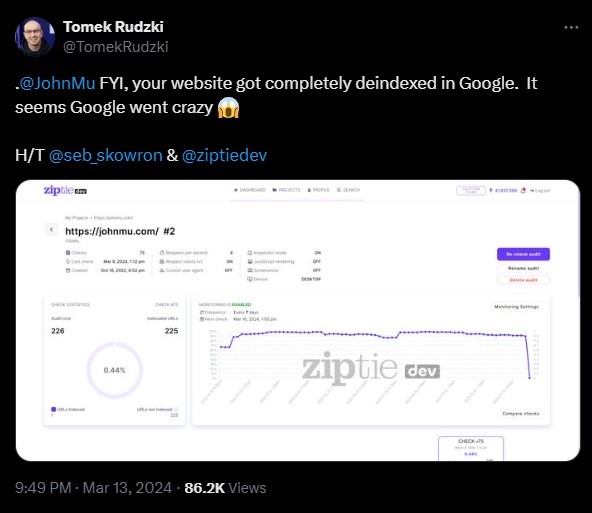
This perfectly demonstrates how adamant Google is about following its rules. Implementing SEO is worth it because it safeguards your website from potential penalties.
So, Is SEO Dead in 2025 and Beyond?
No.
And as long as Google exists and people still seek information, SEO will always be relevant. In fact, SEO is more important than ever.
Remember, SEO is more than publishing quality content and other visible elements on your website. It’s about ensuring every facet of your website, including its on-page, off-page, and technical aspects, is optimized for search engines.
If you need any help boosting your website’s SEO, Brandignity offers full-service SEO solutions to help you attract your target market.
Author’s Bio:
Joel John Cariño has always been fascinated with SEO and the works. For over four years, he has helped clients boost their online visibility through top-notch SEO content with a kick of direct-response copywriting. He now works as an SEO specialist and content writer at IndexCheckr.






